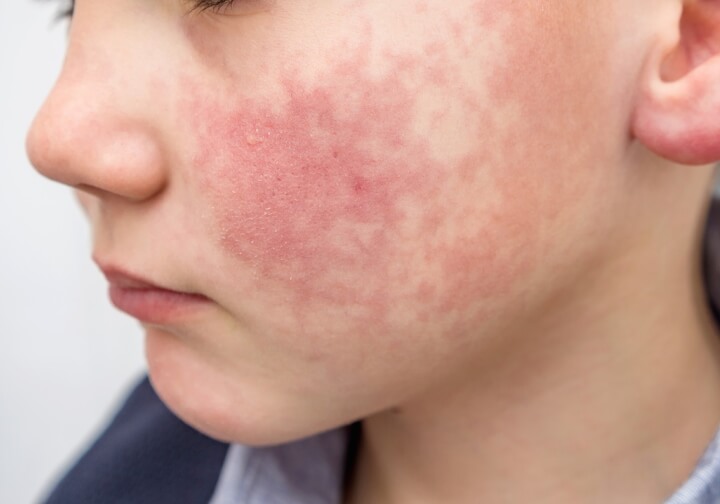
Red cheeks in children - could it be the fifth disease?
The fifth disease is a mostly not very serious viral disease that most often occurs in children between the ages of 5 and 15. One of the characteristic symptoms of the fifth disease is red cheeks, which can cause concern for parents.
Symptoms of the fifth disease
The parvovirus B19 causes the fifth disease and can manifest itself differently. One typical symptom is a distinctive red rash that starts on the child's cheeks, giving them a characteristic "tinge" of red cheeks. The shape of the rash might look like a butterfly, a slap, or an unfading rash after play. This rash often spreads to the rest of the body, with spots appearing on the trunk, limbs and the soles of the feet, but the cheeks remain the most prominent. Children with the fifth disease may have higher body temperature or fever, although some cases may pass without other signs of illness. The first overlooked symptoms may be similar to those of influenza or the common cold, i.e. joint pain, fatigue and, at this time, especially the raised temperature.
The spread of the fifth disease
The fifth disease is spread by droplet infection or contact with infected blood. The incubation period is usually 4-14 days, meaning a child can be contagious even before visible symptoms appear.
Treatment and prevention
The fifth disease usually has no specific treatment and is often treated symptomatically. It is important to ensure that the child gets enough rest and fluids. If necessary, the doctor may prescribe medication for pain or fever. Often, all the doctor needs to do is to call and send a photo of the rash. However, in the case of debilitated children and a worse course of illness, hospitalization may be necessary.
Prevention of the fifth disease can be difficult because the child may be contagious even before visible symptoms appear. However, standard precautions such as regular hand washing and minimally avoiding close contact with obviously infected individuals are essential.
If you suspect that your child may have fifth disease, it is advisable to consult a doctor. The diagnosis can be confirmed by clinical examination and antibody tests. Although the fifth disease usually runs mildly and without serious complications, it is essential to monitor your child's health and not hesitate if it worsens and visit a GP.
